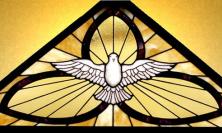If you had to cite an example of fortitude, you might think of someone who holds out under great stress and does their best not to burden others, or of a display of moral strength by someone prepared to stand firm because they believe that anything else would be wrong. Fortitude as a gift of the Holy Spirit, however, is not an upgrade of a character trait in the one who receives it, says James Hanvey SJ. It is, instead, the self-gift of presence from the one in whose constancy and faithfulness we find our hope.
Fortitude is a quality we naturally admire in a friend or a partner; we know we can rely on their constancy and strength, their faithfulness, not only when times are difficult but in all the ordinary and unexciting times as well. Fortitude is to be valued and appreciated just as much in times of boredom or in the mundane business of daily life as it is in times of crisis. Indeed, it is in the dusty routine times that it shines the most, even though we usually only come to appreciate it in retrospect.
In certain situations, we could mistake fortitude for stubbornness. We might even misidentify it as a form of egotism. But real fortitude is not about drawing attention to itself or demonstrating its own superiority. If anything, it likes to be concealed so that it can get on with the work and endure. This is the fortitude that the poet Marge Piercy recognises and celebrates:
I love people who harness themselves, an ox to a heavy cart,
who pull like water buffalo, with massive patience,
who strain in the mud and the muck to move things forward,
who do what has to be done, again and again.[i]
Some people have fortitude naturally; it is the sort of base key that runs through their lives and relationships. For others, it can appear as if from nowhere when the situation requires it. Even when we recognise that fortitude is a matter of character, it doesn’t mean that it is unthinking or always comes as a matter of ease. A display of fortitude requires reflection, choice and decision, even when it is ‘just the right thing to do’.
I think that we all require some measure of fortitude to deal with what life brings us, but what about fortitude as a gift of the Holy Spirit? Is that any different from a quality of character?
The gift of fortitude that the Holy Spirit confers will certainly not diminish what is already present in the recipient’s character, but it is not dependent upon it. It is a ‘gift’, it has a giver and a purpose, which, as with all the gifts of the Holy Spirit, is to guide us into a relationship with Christ and with others. It can manifest itself in long-term, habitual ways, such as constancy in faith, especially when under pressure, or we can discover it in a particular moment of need. Often it will come as a surprise, not least of all to ourselves. Whatever its mode of coming or in whatever way it is received, we will discover that it is never just something for us, it will always be for the benefit of others as well, even when we don’t recognise this, or it remains hidden to those who benefit. The beauty of the way in which the Spirit gives this gift is quiet but effective. Fortitude is not really a ‘noisy’ gift.
Yet, as with all the gifts of the Spirit, so with this one: whatever gift is bestowed, it is never independently of the Spirit’s own self. The Spirit’s self-gift is a sort of indwelling in us whose first ‘work’ is to conform us to Christ. In this sense, if we really want to glimpse the true nature of the gift of fortitude, we should study him. Christ’s fortitude always springs from love: love of the Father and love of us. He cannot be in any other way than this and so fortitude is part of the grace of his own person and flows from his literally ‘being’ in love. If God is love, then how can Christ ‘be’ in any other way? This constancy of being is his mission. Christ's fortitude is his unwavering commitment and consecration to the mission he has received from the Father; his faithfulness to others, especially those who seek him in their moments of desperation or need; and, above all, in his self-gift, his sacrifice in love for the salvation of others.
In praying for the gift of fortitude, we are asking the Spirit to place in our hearts this dynamic faithfulness and constancy in love of God and our neighbour. To withstand all the pressures to give up, especially when we are faced with hatred, hostility or the quiet disdain of indifference. The Spirit’s own presence is our fortitude, our strength to follow Christ and persevere with hope and love right to the very end.
So, when the Holy Spirit comes to us in our need with the gift of fortitude, it is no longer a demonstration of ‘our’ ability to endure. It is a deeply transforming gift that allows us to give to others and to be steady in our love even when it is not acknowledged or returned. This is the real strength on which the healing and the hope of our world depends. You can see it vividly in the women who stand at the foot of the cross, or in the constant care Paul has for his communities, whatever the risks and the challenges, the criticisms, threats, rejections and persecutions he must face. You can see it, too, in all those countless unknown and unsung women and men who have kept faith, who have kept on living, hoping, loving and caring, whatever the cost. They might be members of our family, or community; they might be a partner or parent, a son or daughter, or just the stranger that stayed with us when we needed support and protection. Or you can find it in the constant round of prayer for us in the hidden communities of enclosed life or eremitical solitude, which carries us through the long silent nights when we feel lost and alone. In all these acts of faithfulness and constancy we experience the touch of Christ and God’s gracious faithfulness to us. In them all we see the witness of the Spirit who gathers the community of the Church and bestows upon it the grace of fortitude to carry us. We should never underestimate the courage and the fortitude of the Church and the way in which, whatever the difficulties, the Holy Spirit gives her the grace to continue faithfully in her mission to carry Christ to the weary and suffering world, and to carry the same world to him. It is the Spirit’s gift of fortitude that sustains us as community of faith. It is this gift of the Spirit that sustains the Church’s life and makes it a deep and unfailing well of grace from which a parched humanity can still draw the water of life and refresh its burdened soul.
In the face of opposition from the technicians of a programmed humanity and the high priests of secularism, the gift of fortitude that belongs to the Church is her faithfulness to Christ and to the world from which he cannot be exiled. The gift of fortitude is the Spirit’s guarantee that whatever the trials, Christ and his Church will not desert humanity or pass conveniently from the great drama of human history. This is not some institutional illusion, an old trick learned from dead empires who believed in their own immortality. Part of the gift of fortitude is the underestimated grace of waiting. The capacity to wait – not just to endure – is a patient, trusting alertness in faith, a readiness for the new possibilities of grace. It is a waiting not only for God but on God; that capacity to keep vigil that refuses to give up hope or let history somehow fall into fatalistic despair. It is understandable to lose faith in humanity when faced with the history of humankind, and the countless acts of horror that we can inflict on each other; but the gift of fortitude means we can never despair of God’s grace. Fortitude is the grace of waiting in expectation and hope; keeping the light of faith burning; refusing to withdraw the hand of understanding and care; the courage to raise the prophet’s voice for justice and compassion, to declare God’s mercy before the crowd baying for revenge and blood. Fortitude is the life of the kingdom of God already present in power.
Now we can begin to see that this gift of the Spirit is something that belongs to God’s very self, God’s constancy and faithfulness that is always open to us. And the gift becomes the Spirit’s song in us, the great song of confidence, trust and fortitude that is Psalm 91:
He who dwells in the shelter of the Most High,and abides in the shade of the Almighty,says to the LORD, ‘My refuge,my stronghold, my God in whom I trust!’
He will free you from the snare of the fowler,from the plague that prowls in the darkness;
He will conceal you with his pinions,and under his wings you will find refuge.His faithfulness is buckler and shield.
James Hanvey SJ is Secretary for the Service of the Faith for the Society of Jesus.
[i] Marge Piercy, ‘To be of use’, Circles on the Water: Selected Poems of Marge Piercy (Knopf Publishing Group, 1982).






